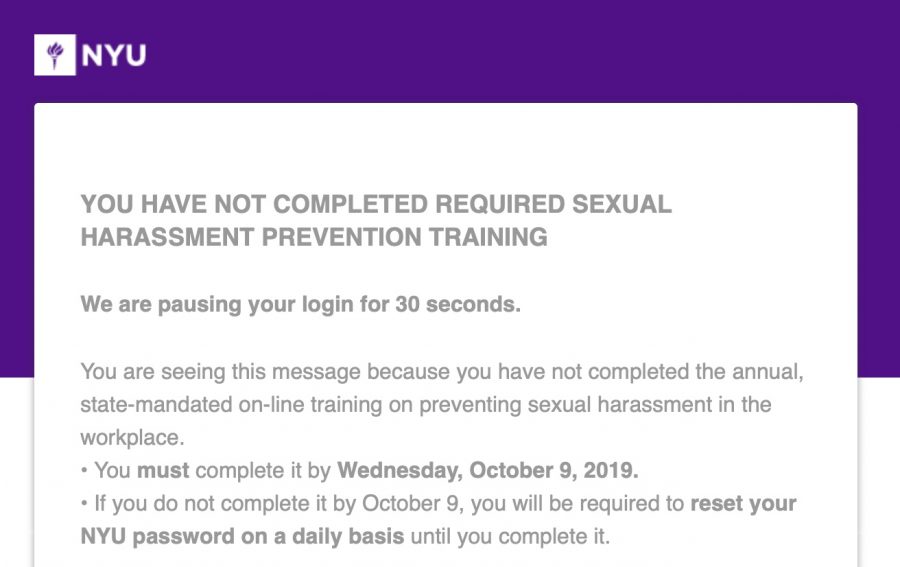Employees — including student employees — have had to wait 30 seconds to log into their NYU accounts starting this week in an effort by the university to encourage them to take a mandatory sexual harassment training course.
The message employees and students receive says they have to complete the course before Oct. 9 and alerts them that the training is required by new laws passed at the state and city level in 2018.
The laws requires all employees to complete the course annually, as part of a statewide initiative to combat sexual harassment. NYU maintains that the course must be completed, even if individuals have taken others as part of their training for NYU. While only intended for employed individuals, many non-employee students told WSN they have been confronted by this message.
Individuals are being obstructed from logging into their NYU accounts as a tension-building reminder to complete the training. If the 30-second page is consistently ignored, individuals will eventually have to change their NYU account password everyday until the course is completed.
“It’s effective, it forces you to do it,” Tandon junior Sofia Lopes said. “I don’t think people should be upset, because [sexual harassment is] a very real problem.”
The course consists of a series of videos and written situations, occasionally requiring the test-taker to answer true or false questions about if the situations constitute sexual harassment. It lasts approximately one hour.
Although she believes the method NYU has employed to incentivize people to complete this course is effective, Lopes doesn’t think that the course itself is enough to address the issue.
“I think it’s [NYU] trying [to solve the problem], but mostly covering their asses,” Lopes said.
Tisch junior Rou Leonard agrees with Lopes.
“I feel like the course is just NYU trying to cover their hands,” Leonard said. “Basically saying that they ‘did what they could do.’”
The training course comes after two members of the NYU community were accused of sexual harassment.
German and Comparative Literature Professor Avital Ronell was found guilty of sexually harassing former graduate student Nimrod Reitman. She returned to NYU this semester following a year-long suspension without pay. NYU’s graduate student union has continued to call for the termination of her position at NYU, required in-person sexual harassment training for staff and students and additional resources for the Title IX office, among other things, in a petition that has collected over 600 signatures.
In previous statements, the university has maintained that its response to the situation was adequate.
Michael Steinhardt — the namesake of the Steinhardt School of Culture, Education, and Human Development and an NYU Board of Trustees member — was accused by seven different women of sexual harassment in May.
NYU launched an investigation into Steinhardt’s interactions with members of the NYU community and found he acted inappropriately toward members of the NYU community. However, in an email sent out by NYU Board of Trustees Chair William Berkley on Sept. 12, NYU decided not to change the name of the school and the only repercussion faced by Steinhardt mentioned was a conversation with Berkley.
Despite NYU’s incessant reminders to make students and faculty complete this training, some students believe that it is a vain attempt to solve the actual issue of sexual harassment on campus.
“I feel like it’s an example of a company or institution reaching a bare minimum to say that they did something,” Stern first-year Chris Giron said. “In actuality, considering their profit is their namesake, they don’t actually carry through very much.”
Leonard also believes that the outcomes of these two cases and the broader issue of sexual harassment is intersectional. He believes one of the reasons that NYU didn’t choose to enforce greater punishments against Ronell and Steinhardt has to do with both individuals being white.
“This is definitely, and I hate to say this, but it is definitely the effect of white supremacy,” Leonard said. “I feel like, subconsciously, people of European descent are held to a different standard than anyone else. If it was a black professor or a black student, they would have been viewed as a bigger threat in the situation.”
Lopes spoke more broadly about the issue and said she doesn’t think that something this serious and prevalent in the NYU community is going to be solved by an online training course.
“It’s definitely not enough,” Lopes said. “How are you going to make people do a sexual harassment course and then not actually tackle the real problem?”
Email Ronni at [email protected].























































































































































